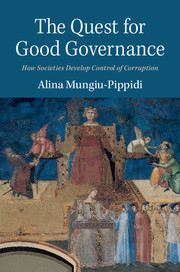Book contents
- Frontmatter
- Colophon
- Contents
- List of figures
- List of tables
- List of abbreviations
- Acknowledgments
- 1 Understanding control of corruption
- 2 Diagnosis and measurement
- 3 The road to Denmark: historical paths to corruption control
- 4 Structure and agency: determining control of corruption
- 5 Understanding contemporary achievers
- 6 Domestic collective action capacity
- 7 International agency and its anticorruption impact
- 8 From critical mess to critical mass: some tentative policy conclusions
- Appendix 1 Explaining bribery
- Appendix 2 List of variables and sources
- Appendix 3 Brief description of databases and surveys used
- Appendix 4 Impact of anticorruption interventions on control of corruption: bivariate regressions
- Appendix 5 HDI differentials from Figure 4.1
- Appendix 6 Classification of countries by governance orders
- References
- Index
3 - The road to Denmark: historical paths to corruption control
Published online by Cambridge University Press: 05 September 2015
- Frontmatter
- Colophon
- Contents
- List of figures
- List of tables
- List of abbreviations
- Acknowledgments
- 1 Understanding control of corruption
- 2 Diagnosis and measurement
- 3 The road to Denmark: historical paths to corruption control
- 4 Structure and agency: determining control of corruption
- 5 Understanding contemporary achievers
- 6 Domestic collective action capacity
- 7 International agency and its anticorruption impact
- 8 From critical mess to critical mass: some tentative policy conclusions
- Appendix 1 Explaining bribery
- Appendix 2 List of variables and sources
- Appendix 3 Brief description of databases and surveys used
- Appendix 4 Impact of anticorruption interventions on control of corruption: bivariate regressions
- Appendix 5 HDI differentials from Figure 4.1
- Appendix 6 Classification of countries by governance orders
- References
- Index
Summary
The norm of ethical universalism in governance
Why do some societies manage to control corruption so it manifests itself only occasionally as an exception, while other societies do not and remain systemically corrupt? And is the superior performance of this first group of countries a result of what they do, or of what they are? Most current anticorruption strategies presume the former, which is why institutions from developed and well-governed countries are currently being copied all around the world. At least on paper, there are few states left lacking a constitutional court, some form of checks and balances, or an ombudsman (47 ombudsmen in 1990, 100 in 2003, and 135 by 2008) (see also Table 4.2 in Chapter 4). Skeptics, on the other hand, endorse the latter view, believing in the cultural determinism of corruption and good governance. More recently, following the failure of the first generation of anticorruption reforms, a middle position has begun to emerge: the most relevant lessons lie not in what developed countries are currently doing to control corruption, but rather in what they have done in the past, when their societies more strongly resembled the conditions in today's developing world (Andrews 2008). However, as this subject area is largely unknown to governance scholars and practitioners alike, it is difficult even to estimate the potential value of such historical lessons. This chapter addresses this gap by asking not how corruption is eradicated today, but rather how societies have built systems over time to protect their common resources from being spoiled by individuals or groups. And it answers this question by looking at the oldest group of achievers: core European polities.
Thus far, Europeans have enjoyed the most success in building regimes based on ethical universalism, alongside a group of former colonies populated mostly by Europeans (e.g., the United States and Commonwealth countries) and a handful of other countries (Japan, Chile, Singapore, a couple of tiny Asian monarchies) with designs that are mostly of European inspiration. European control of corruption can be regarded as almost the only historically successful process of state building in which a long transition to ethical universalism has resulted in an equilibrium where opportunities for corruption are largely checked by societal control of rulers and reasonable reciprocal control by the government.
- Type
- Chapter
- Information
- The Quest for Good GovernanceHow Societies Develop Control of Corruption, pp. 57 - 82Publisher: Cambridge University PressPrint publication year: 2015
- 1
- Cited by



